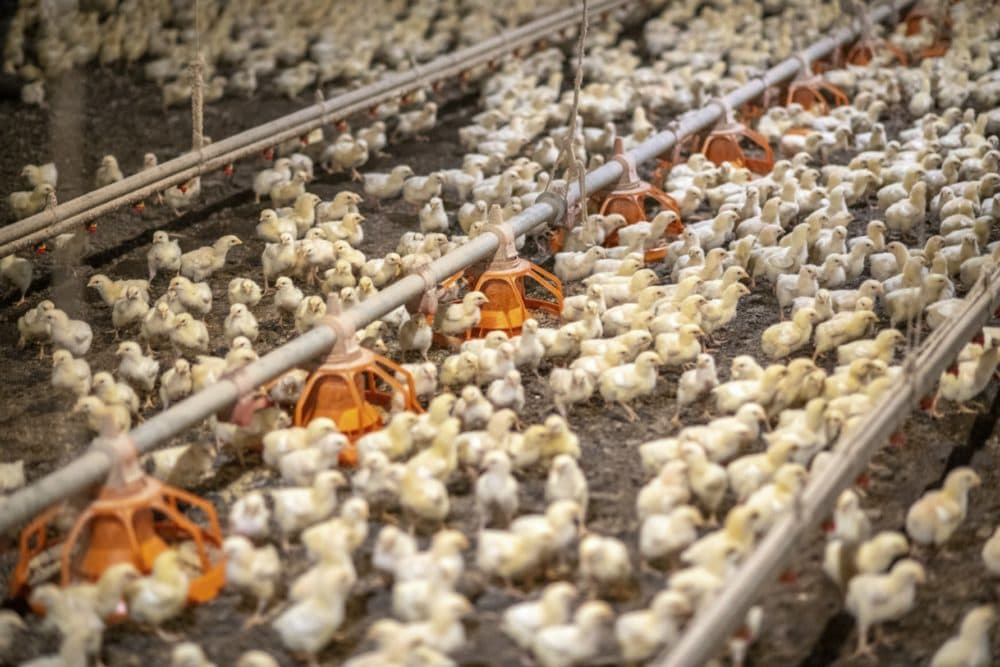Advertisement
Commentary
More Americans Are Eating Plant-Based Diets. This Might Help End Animal Prisons

“A conservative, with a Catholic upbringing, and a vegetarian? Boy, talk about aggrieved minorities,” a waggish columnist once quipped about a friend who, like me, fit that description.
I’m feeling less aggrieved these days, as the wave of popular dietary tastes breaks my way. Fast-food chains sell plant-based burgers and breakfast sausages to a public that’s gobbling them down, thinking they taste like the real thing. What’s next — the president hawking vegan Trump steak from the East Room? Even cow’s milk is losing ground to plant-based alternatives.
Different people travel different roads to vegetarianism. Some want sustainable agriculture that contributes less to climate change; some are seeking a healthier lifestyle. My own conversion pivoted off the realization that, in good conscience, I could no longer subsidize factory farming. Those are farms where five to 10 egg-laying hens are crammed into drawer-sized wire cages, sometimes fatally, without space even to turn around; and where highly sentient pigs are crated, also without turning room, and without bedding or nursing space for their young, whose tails are severed sans sedatives to prevent the piglets from tail-biting.
I try to avoid off-putting dogmatism. I eat shellfish that cognitively are the functional equivalent of plants, and I have some sympathy for consuming humanely raised and slaughtered meat, assuming you can afford and find it. For me, going vegetarian was easier and, done right, healthier. But most people, unintentionally or not, adopt an out-of-sight-out-of-mind philosophy about buying factory-farmed food.
So I’m happy that a vegan with political power has a plan to rein in euphemistically camouflaged “concentrated animal feeding operations,” or CAFOs. Sen. Cory Booker’s presidential dreams may have wilted faster than lettuce in a California drought, but let’s hope his recently filed Farm System Reform Act has longer legs — especially as parts of it have the expressed support of two remaining presidential contenders, Bernie Sanders and Elizabeth Warren.
CAFOs essentially are prisons for animals, producing close to all of the meat and poultry Americans eat. Squatting at the crossroads of animal cruelty and corporate greed, they have the largest use of “intensive confinement methods” of the kind mentioned above. The bill by Booker would pause the building of new CAFOs and prohibit expansion of the most king-sized ones (those with more than 125,000 chickens, for example).
Longer-term, the legislation would set aside $100 billion over a decade to buy out owners of CAFOs or help them switch to more humane and sustainable agriculture “such as raising pasture-based livestock, growing specialty crops, or organic commodity production.” Booker and Sanders both advocate for anteing up public money to help livestock growers, as Mother Jones puts it, “get out from under the thumb of the packers,” the transnational corporate giants that contract with hog- and chicken-growers and slaughter and wrap pork and poultry. (The chance to throw a hard elbow at greedy corporations doubtless explains Sanders’ position.)
Putting up money to buy growers’ freedom is a vital part of the plan. A Missouri small-agriculture activist also told Mother Jones:
Most contract growers I talk to, they wish they hadn’t gotten into that world to start with — it’s a hamster wheel that’s not easy to get off of. If you don’t keep taking on more debt to upgrade your barns, you don’t get more birds or pigs [from the companies]; and if you stop, you can’t pay the note in your farm.
Sanders and Warren support a moratorium on CAFO construction (so does Tulsi Gabbard, also a vegan). But Booker’s bill goes further. Current law saddles those debt-pressed growers with responsibility for cleaning up manure-related pollution; Booker would shift it to the packers.
That’s only fair, as the size of the growers’ barns, and hence resulting pollution, is set by the packers in the contracts they require from livestock growers. Might having to pay the clean-up bill be at least a small financial inducement, for companies that understand dollars and cents, to limit their contract dictates? Dairies with 2,000 cows or more, which have increased in recent years, spew 90 million pounds of manure, each, annually.
... farm policy has long centered on wasteful welfare to corporate agriculture.
Growers are hardly without responsibility. While they are technically independent contractors, they operate for all intents and purposes as big packers’ “production arm” (Mother Jones’s words again). Consider that taxpayers guaranteed almost $2 billion in “small business” loans to behemoth-backed chicken growers over the four years ending in 2016.
That shouldn’t be a surprise; farm policy has long centered on wasteful welfare to corporate agriculture. We non-meat eaters shouldn’t be smug, as lots of those subsidies fertilize a few politically influential commodity crop growers (think soybeans and corn). No one’s betting on Booker’s bill making it past the Republican Senate and White House.
But things change; who foresaw, just a few years ago, that carnivorous Americans would enjoy Impossible Whoppers and other plant-y substitutes?
Contrary to what Fox News-watching hysterics might say, Booker and CAFO-questioning candidates aren’t talking about banning burgers — they’re injecting a little decency into the process from pasture to plate. Perhaps the public that’s chewing on plant-based meat also will chew on what our farming methods have wrought on waistlines, weather and welfare of creatures over which the Book of Genesis, for better and worse, granted us dominion.
